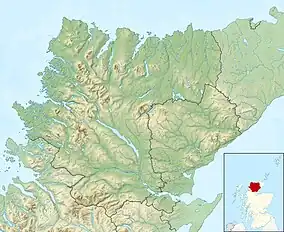Loch Sionascaig
Loch Sionascaig is a large irregular shaped, freshwater loch in the remote Coigach area of northern Wester Ross.[1][2] It is located 5.5 miles southeast of the village of Lochinver and is situated within the Inverpolly Forest.[3]
| Loch Sionascaig | |
|---|---|
 On the nose of Sron Gharbh overlooking Loch Sionasgaig and Stac Pollaidh | |
 Loch Sionascaig Location in Wester Ross | |
| Location | NC11491394 |
| Coordinates | 58.0733°N 5.1957°W |
| Type | freshwater loch |
| Primary outflows | Unnamed |
| Max. length | 4.8 km (3.0 mi)[1] |
| Max. width | 1.6 km (0.99 mi)[1] |
| Surface area | 558 ha (1,380 acres)[2] |
| Average depth | 60.3 ft (18.4 m)[1] |
| Max. depth | 215.8 ft (65.8 m)[1] |
| Water volume | 3,626,243,856.8 cu ft (102,683,791.00 m3)[1] |
| Shore length1 | 37 km (23 mi) [2] |
| Surface elevation | 76 m (249 ft)[2] |
| Max. temperature | 54.2 °F (12.3 °C) |
| Min. temperature | 49.6 °F (9.8 °C) |
| Islands | 12 main islands and many smaller islands |
| 1 Shore length is not a well-defined measure. | |
Geography
Loch Sionascaig[lower-alpha 1] is an area of outstanding natural beauty, that lies at the centre of the Inverpolly National Nature Reserve.[4] It is surrounded by many other lochs with the large forested areas of Inverpolly Forest and Loch Lurgainn to the south. Also directly south is Loch an Doire Dhuibh which is connected by a narrow channel to Loch Sionascaig. To the southeast is the imposing peak of Cùl Beag and Drumrunie Forest. To the east is the large Loch Veyatie, to the northeast is the mountain of Stac Pollaidh and Canisp behind it. To the north west is Loch Ùidh Tarraigean and Loch na Dàil that Loch Sionasgaig drains through, reaching the River Polly that drains into Polly Bay.[5] To the west are the large lochs of Loch Bad A' Ghaill and Loch Osgaig.
Loch Sionascaig has numerous islands that are wooded. Eilean Mòr is the biggest and has a small hill that rises to 116m[6] giving excellent views of the surrounding loch.
Fishing
Loch Sionascaig is a renowned fishing loch with trout of around 6oz in size caught in the shallows up to more than 16lbs in the deeps.[4]
Academic study
Loch Sionascaig is one of the intestively academically studied lateglacial and Holocene sites in Scotland.[7] Types of analysis that have been undertaken at the site include pollen analysis, diatom analysis, sediment geochemistry, peat stratigraphy and radiocarbon dating.[7]
Notes
- In the Bathymetrical Survey, the loch that is referenced as Loch Skinaskink
References
- John, Murray; Lawrence, Pullar. Bathymetrical Survey of the Fresh-Water Lochs of Scotland, 1897–1909 Lochs of the Polly Basin Volume II – Loch Skinaskink. p. 169. Retrieved 23 July 2022.
 This article incorporates text from this source, which is in the public domain.
This article incorporates text from this source, which is in the public domain. - "Loch Sionascaig". Centre for Ecology and Hydrology. Scotland and Northern Ireland Forum for Environmental Research (SNIFFER). Retrieved 23 July 2022.
- Gittings, Bruce; Munro, David. "Loch Sionascaig". The Gazetteer for Scotland. School of GeoSciences, University of Edinburgh and The Royal Scottish Geographical Society. Retrieved 23 July 2022.
- Sandison, Bruce (1997). Trout & Salmon Rivers and Lochs of Scotland. Stackpole Books. p. 178. ISBN 978-1-873674-31-4.
- Gittings, Bruce; Munro, David. "River Polly". The Gazetteer for Scotland. School of GeoSciences, University of Edinburgh and The Royal Scottish Geographical Society. Retrieved 28 October 2022.
- Gittings, Bruce; Munro, David. "Eilean Mòr". School of GeoSciences, University of Edinburgh and The Royal Scottish Geographical Society. Retrieved 28 October 2022.
- Gordon, J. E.; Sutherland, D. G. (6 December 2012). Quaternary of Scotland. Dordrecht: Springer Science & Business Media. p. 140. ISBN 978-94-011-1500-1.
